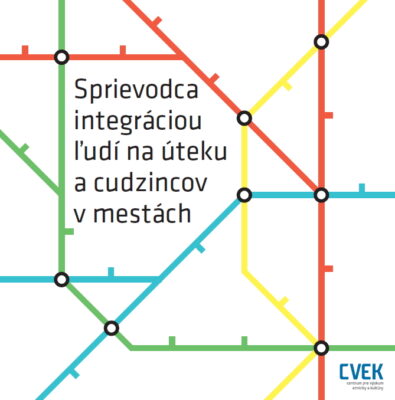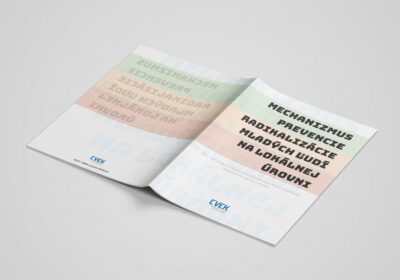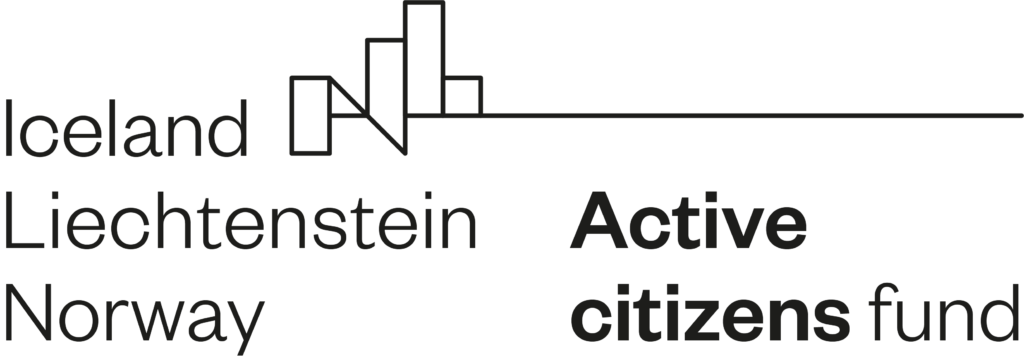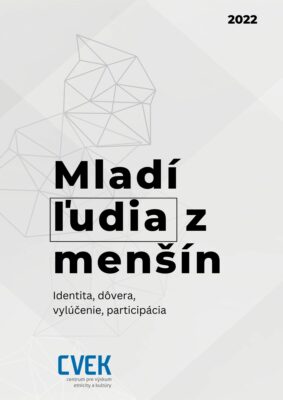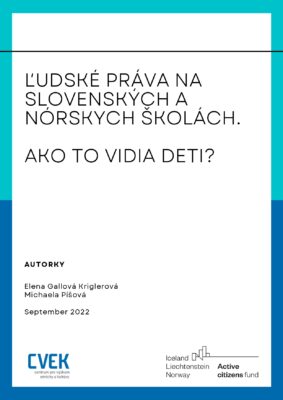Publications
A roadmap to integrating refugees and foreigners in cities
This handbook is especially intended for local governments and other actors working at the local level on
inclusion of foreigners, but especially of people on the run (refugees) in local communities.
The issue of migration will become more and more topical in the future and the following topics can significantly help municipalities to manage this situation not only now but also in the future. By setting quality policies, measures and support services for refugees/foreigners, it is possible to achieve quality integration, prevent social tensions and use not only the challenges but also the opportunities that migration brings for the overall development of local communities.
Here you will find a variety of information regarding the situation of refugees/foreigners as well as their specificities and needs. At the same time, we present a number of steps, suggestions and measures to be implemented in all areas of integration.
The Roadmap to the Integration of Refugees and Foreigners in Cities is published with the support of the U.S. Embassy Bratislava.
Mechanism for preventing radicalisation of young people at local level
The Radicalisation Prevention Mechanism is the result of the work of experts from the Centre for Research on Ethnicity and Culture, other experts from various institutions working on the prevention of radicalisation of young people at the local level, and active young people who have been involved in its development.
The reason why we decided to create this document is our desire to help local actors to deal with the increasing social tensions that affect young people in particular. We believe that the best way to deal with radicalisation is to implement the most effective prevention and support activities for young people that respond to their needs and prevent them from resorting to hate speech and extremism. At the same time, if the first signs start to emerge that young people are becoming radicalised, it is necessary to have effective mechanisms in place to respond to this situation.
The mechanism should serve all actors at local level, i.e. municipalities, schools, police, NGOs, youth clubs, counselling facilities and others who see the urgency of the problem of radicalisation of young people, perceive the need to address it, but have not yet found a way to act.
The mechanism for prevention of radicalisation of young people at the local level was created as part of the project ‘Mechanism for prevention of radicalisation and extremism-police and youth together’, which is supported by the ACF-Slovakia programme, funded by the EEA Financial Mechanism 2014-2021. The administrator of the programme is the Ekopolis Foundation in partnership with the Open Society Foundation Bratislava and the Karpatská nadácia (Carpathian Foundation).
Pandemic as a human rights lesson
This book is another publication of the Centre for Research on Ethnicity and Culture, which deals with vulnerable groups and their place in Slovak society. The book highlights how the pandemic has affected children and young people, the elderly, Roma, foreigners and people with disabilities. In individual chapters, we describe how various measures during the pandemic affected the lives of these groups and note in several places that the position of various vulnerable groups was exacerbated during this period. Moreover, as we highlight, the anti-pandemic measures were problematic in terms of respect for human rights. However, we also make a number of recommendations that could and should lead to better public policies in the future.
Cohesion and trust in society is largely dependent on how we can ensure that the needs of all citizens are met. It is important that every person can feel that Slovakia is his or her country too, even in times of crisis and uncertainty. For this, we need functional institutions that are there for us whenever we need them.
Implemented with the financial support of the Ministry of Justice of the Slovak Republic within the framework of the subsidy programme for the promotion, support and protection of human rights and freedoms and for the prevention of all forms of discrimination, racism, xenophobia, anti-Semitism and other manifestations of intolerance.
Young people from minorities – identity, trust, exclusion, participation
This analysis is the first output of the project entitled “A part for all – promoting participation of young people from diverse groups”, which we have been implementing at CVEK since the beginning of May 2022.
At CVEK, we have been working on the topic of participation of different minority groups for several years now, pointing out that the involvement of diverse groups in policy-making, but also more generally in the life of society, is key to creating a cohesive society. Young people from different minority groups or groups that can be perceived as vulnerable are at an even greater disadvantage than young people in general in terms of participation and having their voices heard.
Meanwhile, young people have faced many challenges in recent years that previous generations did not face. The COVID-19 pandemic, the climate crisis, inflation, the growing influence of social networks and disinformation, significant social changes – all these are issues that have a much more significant impact on young people, and especially on young people from minority backgrounds.
In our current project, we focus on young Roma men and women, young people from the LGBTI+ community, young foreigners, young people with disabilities and young people from socio-economically disadvantaged backgrounds in Bratislava and its surroundings. Our aim is to empower young people from minority backgrounds and help them develop their skills so that they can actively participate in their neighbourhoods and communities.
In the first phase of the project, we conducted research to understand the situation and perceptions of young people from minority backgrounds and to give them a voice. The findings from the research are included in this analysis. In the interviews we explored four themes: perceptions and experiences of their own minority identity, trust in institutions and perceptions of support from institutions, experiences of social exclusion and experiences of participation.
The project “A part for all – promoting participation of diverse young people” is supported by the Erasmus+ programme, Key Action 2: Collaborative Partnerships.
Human rights in Slovak and Norwegian schools. How do children see it?
This publication is the result of research that focused on how human rights are reflected in the school environment in Slovakia and Norway. Based on a comparative approach, we present both an analysis of educational documents and policies in both countries in relation to human rights education, as well as the perspectives, opinions and recommendations of the children themselves. The research shows that for children in both Slovakia and Norway, human rights is a very important topic that they believe definitely belongs in schools. Children need and want to talk about these topics, but they stress that they do not just want to learn lessons, but rather to discuss the topics and use various interactive and playful forms of learning. In Norway, children encounter this approach systematically, in Slovakia only occasionally, if they are lucky enough to have empathetic and well-prepared teachers.
Preparation of the comparative study “Human Rights in Slovak and Norwegian Schools – How do children see it?” was supported by the Bilateral Fund of the ACF-Slovakia programme, which is funded by the EEA Financial Mechanism 2014-2021. The programme is managed by the Ekopolis Foundation in partnership with the Open Society Foundation Bratislava and the Carpathian Foundation.
Preventing radicalisation and extremism from an institutional perspective
Within the framework of the project Mechanism for the prevention of radicalisation – young people and the police together, in addition to quantitative research and focus groups with young people, we also conducted individual semi-structured interviews with representatives of institutions that deal with the topic of radicalisation prevention.
Our aim is to know the undercurrents and factors that influence extremism and radicalisation among young people. Therefore, our interviews with representatives of various institutions focused primarily on their own perceptions of the phenomenon, the factors that influence it and the social situation that may influence young people to take the extremist side. We also focused on the topic of trust in institutions and young people’s voice, which have been shown in various research to be important factors related to this topic.
In our research, we also looked at the challenges we face as a country on the topic of radicalization and how the state approaches it through its policies and legislative settings, or by supporting different organizations in implementing prevention programs.
An important part of the research was also to learn about the specific activities of individual organisations and institutions in order to implement the project effectively in its next phases and to build on what is already working in practice.
This publication is therefore a basic analysis of the institutional perspective on the topic of preventing radicalisation of young people.
This publication is published as part of the project ‘Mechanism for the Prevention of Radicalisation and Extremism-Police and Youth Together’, which is supported by the ACF-Slovakia programme, funded by the EEA Financial Mechanism 2014-2021. The programme is managed by the Ekopolis Foundation in partnership with the Open Society Foundation Bratislava and the Carpathian Foundation.
Youth and extremism. Factors influencing the radicalisation of young people and their perception of its manifestations
The publication Youth and Extremism is published within the framework of the project Radicalisation Prevention Mechanism – Police and Youth Together. It aims to contribute to effective youth radicalisation prevention policies.
As we consider it important that young people’s voices are heard in the processes of developing various prevention policies, we decided to involve them in the whole process of developing the prevention mechanism. We want to build on their views, needs and respond to the current problems of young people that can potentially lead to support for extremist groups or radicalisation.
The research consisted of two parts – quantitative questionnaire research and focus groups. The representative questionnaire research focused on different areas and factors that may underlie extremism and radicalisation. The research respondents were 1,005 young people aged 16-25, with the sample being representative in terms of gender, regional distribution, the size of the settlement where the young people live and other socio-demographic characteristics.
Based on initial findings from the quantitative research, we conducted seven focus groups with young people from different regions and backgrounds in early 2022. The sample included active young people involved in various participatory processes, as well as young people attending various low-threshold facilities. There were students from high schools, but also from vocational high schools and a university, in order to cover as diverse a range of young people’s views and needs as possible. In total, 43 young people participated in the focus groups.
Both quantitative and qualitative research focused on different areas of inquiry: young people’s perceptions of diversity in society, social capital and social problems, trust in institutions, trust in different sources of information, and perceptions of extremism and its various manifestations.
This publication is published as part of the project ‘Mechanism for Preventing Radicalisation and Extremism-Police and Youth Together’, which is supported by the ACF-Slovakia programme, funded by the EEA Financial Mechanism 2014-2021. The programme is administered by the Ekopolis Foundation in partnership with the Open Society Foundation Bratislava and the Carpathian Foundation.
Slovakia and Migration. Finding Pathways to Coexistence. Summary
The book brings interesting findings allow us to see coexistence in diverse society from both expert and humane point of view. It is a result of a two year long research project focused on integration of foreigners in Slovakia. The project entailed two representative quantitative surveys (among foreigners and majority population), one questionnaire survey among municipal offices of district capitals, 58 individual interviews with local leve integration actors, 9 focus groups with majority population and 50 individual interviews with foreigners living in Slovakia.
This research mosaic thus explores integration of foreigners comprehensively from different perspectives. It shows that public institutions are not ready to actively work towards integration of foreigners. Migrants remain invisible for public policies. Majority population sees migration as a threat rather than an opportunity. Contacts with foreigners, however, help change these attitudes to a great extent and contribute to peaceful coexistence. For foreigners, Slovakia is a nice and peaceful country offering opportunities to live a good life. It has potential to grow which is, however, hampered by our closemindedness towards diversity.
The project “Integration of foreigners – researching barriers, instruments and attitudes is co-funded by the European Union from the Asylum, Migration and Integration Fund. Internal Security Fund.
Information for those helping people from Ukraine
Many people in Slovakia today are helping people fleeing the war in Ukraine in various ways – whether as volunteers, providing accommodation or otherwise coming into contact with them. This help deserves great admiration. However, it can also be challenging. That’s why CVEK, in cooperation with the Milan Šimečka Foundation, has prepared a basic package of information for those who are helping people fleeing Ukraine in any way, so that they know what to expect from the situation and are able to cope with it together with the refugees, and also so that they can direct them when they need practical information. In this newsletter you will therefore find information on what refugees are experiencing, how it manifests itself and how to cope with it. But you will also find practical information on how to help them with things like cash withdrawals, sim card arrangements and temporary online education for their children.
Refugee children in schools – first steps and principles
Refugee children, who may already be starting to attend Slovak schools, find themselves in a situation they never knew could happen just a few days or weeks ago. They have had to leave their home from one day to the next and find themselves in a country that many of them have never even heard of. They may be experiencing trauma and be under a great deal of stress from having left their homes so quickly. We have prepared some principles and recommendations for schools on how to deal with this situation, at least in the beginning.
